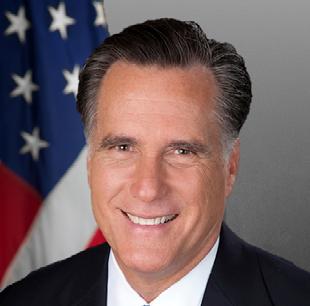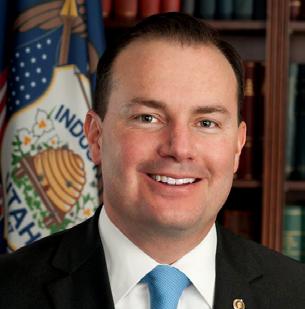PRIORITIES 2023 FEDERAL



As a dedicated advocate and steward for Utah’s economy and the prosperity of its people, the Salt Lake Chamber has championed big-picture issues that shape the economic landscape of our great state. From taxation and regulation to international trade, labor laws, energy and infrastructure, we are focused on fostering a robust economic environment in Utah. However, we recognize that Utah’s economic well-being is intricately linked to the health of the national economy. With this understanding, we have broadened our focus to encompass a diverse range of federal priorities that are instrumental in ensuring a long-term, strong national economy — critical to Utah’s ongoing economic prosperity.
While core economic issues remain relevant and significant, we also want to emphasize the following key priorities of permitting reform, improving foreign relations, advocating for immigration reform, addressing fiscal policy, promoting free markets, improving grid resiliency, access to Reagan National Airport, and promoting civility in political engagement.
By prioritizing these emergent critical issues, the Salt Lake Chamber seeks to ensure a strong, vibrant and resilient economy in Utah — one that is interconnected with and contributes to the long-term success of our nation.
We thank our entire Federal Delegation, and invite you to collaborate with the Utah business community in shaping policies that pave the way for economic prosperity and opportunities for every citizen. Together, we can build a future that benefits not just Utah but the entire nation, fostering an enduring legacy of growth and stability. Thank you for your unwavering dedication to public service. We eagerly anticipate working alongside you to achieve our shared vision of a prosperous and thriving America.
Sincerely,
DEREK MILLER President & CEO Salt Lake Chamber
 GARY HOOGEVEEN 2023-2024 Board Chair
GARY HOOGEVEEN 2023-2024 Board Chair

The Salt Lake Chamber is Utah’s largest and longest-serving business association. A statewide chamber of commerce with members in all 29 Utah counties, the Chamber represents the broad interests of the state’s 63,000-plus employers, which employ more than 1.4 million Utahns. This includes thousands of Chamber members and their employees. With roots that date back to 1887, the Chamber stands as the voice of business, supports its members’ success and champions community prosperity.
We stand as the voice of business, support our members’ success, and champion community prosperity.
Unlimited opportunity and prosperity.
Advocate Policy Build Business Connect Community
Member Centered
We exist to serve our members.
Community Focused
We contribute to a flourishing community where all have the opportunity to thrive.
Common Ground
We serve as a trusted information source and convener of collaborative community partners.
Free Enterprise
We extol and support the virtues of America’s spirit of free enterprise.
Corporate Citizenship
We cultivate businesses as creators and stewards of the economic ecosystem.
In June 2021, the United States Chamber of Commerce awarded the Salt Lake Chamber with the highest 5-Star Accreditation for its sound policies, effective organizational procedures and positive impact on the community.
Senate Committee on the Judiciary
Senate Committee on Energy and Natural Resources
Joint Economic Committee
Senate Committee on the Budget
REPRESENTATIVE
JOHN CURTIS
House Committee on Energy and Commerce
House Committee on Natural Resources
REPRESENTATIVE BURGESS OWENS

House Committee on Education and the Workforce
House Committee on Transportation and Infrastructure
Senate Committee on Foreign Relations
Senate Committee on Health, Education, Labor and Pensions (HELP)
Senate Committee on Homeland Security and Governmental Affairs (HSGAC)
Senate Committee on the Budget
REPRESENTATIVE BLAKE MOORE




House Committee on Ways and Means
House Committee on Budget
*District 2 representative yet to be determined at time of publication.
In recent years, incivility in politics has become a significant problem. Many elected officials have engaged in personal attacks, used derogatory language, and refused to work with one another on critical issues. This type of behavior undermines the democratic process and erodes trust in our elected leaders. Utahns are known for their collaborative spirit, working together to achieve common goals and find solutions to complex challenges. This spirit of collaboration is deeply ingrained in the state’s culture and reflected in everything from our strong community ties to our innovative businesses and public institutions.
Continue to lead with civility by setting a positive example, fostering a culture of respect and cooperation, reducing inflammatory rhetoric, and promoting accountability for incivility.
Collaborate in the spirit of Utah to create a more productive and effective legislative environment that benefits all Americans.

When seeking permits, onerous regulations and red tape can cause delays, increase costs, and reduce flexibility. The process can be time-consuming, which can delay projects and limit the ability of businesses to respond to market demands. In addition, complying with regulations and red tape can be costly, as businesses may need to hire specialized consultants or lawyers to navigate the process. The complexity of the permitting process can create uncertainty, which can deter investment and discourage economic growth.
Enact meaningful, durable legislation to modernize our nation’s permitting process.
Streamline the permitting process and reduce the time required to obtain permits.
Improve the coordination between different agencies so businesses would be able to start infrastructure projects more quickly, respond more rapidly to market demands, and create jobs more effectively.

The foreign relations between the United States and China have entered a period of escalating strain, marked by a trade war that has sparked tariffs and economic uncertainty. Alongside economic tensions, military competition has contributed to the mounting pressures between the two nations. However, it is not only in these traditional arenas that the strain is felt. The rise of cybersecurity concerns has further complicated our already intricate relationships. As cyberattacks become increasingly frequent and sophisticated, the United States finds itself grappling with a pressing challenge that intersects with the broader landscape of foreign relations. These multifaceted tensions create a challenging environment, impacting areas of cooperation and communication between the U.S. and China.
Look at opportunities for near-shore manufacturing of critical technologies and components, reducing the reliance on foreign suppliers and enhancing supply chain security.
Provide incentives for companies to invest in domestic manufacturing capabilities, funding research and development of new technologies, and promoting greater collaboration between government and industry.
Prioritize legislation that strengthens cybersecurity and data protection measures, such as the establishment of mandatory cybersecurity standards for critical infrastructure, increased investment in cybersecurity workforce development, and greater transparency and accountability in cybersecurity practices.
Work towards building partnerships with international allies to enhance global cybersecurity efforts, share information and best practices, and establish common cybersecurity standards.
The United States faces a critical workforce shortage crisis across many industries and sectors. This shortage has been exacerbated by several factors, including an aging population, declining birth rates, and a mismatch between the skills of the workforce and the demands of the job market. The shortage is particularly acute in industries such as healthcare, technology, construction, and manufacturing, where the demand for skilled workers is high and the supply of qualified candidates is low. This has led to increased competition for workers, higher labor costs, and slower economic growth.
Modernize the legal immigration system: Modernize the legal immigration system by increasing the number of visas available for high-skilled workers and family members of U.S. citizens and permanent residents and reducing wait times for the processing of applications.
Address border security: Invest in modern technology and resources to improve border security and prevent illegal immigration.
Address asylum policies: Work to reform asylum policies and procedures to ensure that asylum seekers are treated with fairness and dignity, while also protecting national security interests.
Address family separation: Work to end family separation at the border and ensure that families are kept together while their immigration cases are being processed.
Bailouts can have long-term consequences for the federal budget. When the government provides financial support to troubled financial institutions, it is essentially taking on their liabilities. This can create a significant burden on the federal budget and limit the government’s ability to fund other important priorities. While bailouts may be necessary in some circumstances to prevent systemic collapse, they should be used sparingly and with caution. It is important for the government to carefully consider the costs and benefits of bailouts, and to explore alternative solutions that can help prevent financial crises in the first place.

Prioritize policies that promote responsible and sustainable behavior in the financial industry. This can be achieved through intentional and careful oversight and incentives for prudent risk management and corporate governance.
The American economic system thrives on the principles of free enterprise, enabling businesses to nurture groundbreaking ideas, become industry leaders, and establish organizational structures that suit their needs. The government’s role in the free market is vital, ensuring fair competition and adherence to established regulations, and helping to create a dynamic marketplace that fosters growth, expands opportunities, and bolsters community prosperity. Free markets facilitate the opportunity for a business to achieve both environmental stewardship and financial success. In fact, the Utah business community has long been actively contributing to environmental improvements and social impact. This demonstration of corporate social responsibility (CSR) is a critical component of the positive developments taking place in our state, all without the need for required federal overreach through environmental, social, and governance (ESG) mandates.
Prioritize policies that promote state and local decision-making authority, and that reduce the regulatory burden on businesses and individuals. By empowering states and localities to make decisions that are tailored to their unique needs and circumstances, we can create a more responsive and effective government that is accountable to its constituents.
Consider the costs and unintended consequences of federal regulations and mandates. While well-intentioned, these policies can create unnecessary burdens and hinder innovation and growth in the private sector.
Take a thoughtful and balanced approach to regulation, and that you carefully consider the potential impact on businesses, workers, and communities.
Engage in constructive and collaborative dialogue with stakeholders from all sides of the political spectrum. By working together, we can find common ground and develop policies that promote the common good, while respecting the principles of federalism and limited government.
The electric grid is a critical component of our national infrastructure, providing power to homes, businesses, and public institutions across the country. Any disruptions to the grid can have widespread impacts on public health and safety, as well as economic stability. Modern society has become increasingly dependent on electricity for everything from communication and transportation to healthcare and emergency response.
Given these facts, grid disruptions can lead to significant disruptions in our daily life, especially in the event of extreme weather events, natural disasters, or cyberattacks. Congress has a responsibility to ensure that the electric grid is capable of withstanding potential threats and disruptions and to invest in measures that will improve grid resiliency and protect the American people.
Pass legislation to strengthen cybersecurity protections for the electric grid, such as mandating regular cybersecurity assessments and increasing penalties for cyberattacks on critical infrastructure.
Invest in research and development of new technologies that can enhance grid resiliency, such as microgrids, smart grid technologies, and advanced weather forecasting and monitoring tools.

Ronald Reagan International Airport (DCA) has been governed by a perimeter rule since 1966. Over the years, that rule has changed to allow flights from further and further away, but the same basic principle has remained: DCA is to serve as a short-and medium-haul airport in the Washington D.C. area. The larger Washington Dulles International Airport (IAD) is to be the area’s primary international and longer domestic hub. The perimeter rule currently allows for flights within 1,250 miles of the airport. Only 20 daily roundtrip flights are allowed to operate from DCA to airports outside this perimeter.
Currently, there is only one flight per day from SLC to DCA, which can limit scheduling flexibility and cause delays or missed opportunities for important meetings. This can impact the ability of Utah-based businesses to compete effectively in the national and global marketplace. By adding a second flight to/from Salt Lake City, business travelers would have increased options and flexibility in scheduling, leading to greater productivity and opportunities for growth. WE CALL UPON
Pass legislation that amends the perimeter rule and adds a small number of beyond-perimeter flights to include Salt Lake City. This change would greatly benefit the economy of Utah and benefit businesses and individuals throughout the state.
Misguided regulations can create more harm than good to economic conditions by imposing unnecessary costs and burdens on businesses, reducing their competitiveness and ability to create jobs. Regulations that are not well-designed or based on sound science can lead to unintended consequences, such as stifling innovation and reducing productivity. Regulations can play an important role in protecting public health and the environment, but they must be carefully designed and based on sound science to avoid unintended consequences and unnecessary costs. Regulatory agencies must balance the need for protection with the costs of compliance, and engage in ongoing evaluation and improvement of their regulatory programs to ensure they are achieving their intended goals in the most efficient and effective way possible.
Advocate for a more flexible approach to regulation that allows companies to adapt to changing circumstances and take advantage of new technologies.
Require an economic impact assessment of the regulation to understand its potential costs and benefits, and to identify ways to minimize the impact on businesses and consumers.
Demand for transparency from regulatory agencies, including access to data, research, and analysis that underpins the regulation.
Reduce the burden of compliance, simplify the regulatory process, and streamline the regulatory system to make it more efficient and effective.
The Colorado River Compact is a legal agreement that was signed in 1922 between seven western U.S. states, including Arizona, California, and Utah. The compact allocates the use of water from the Colorado River and its tributaries, which is a crucial source of water for the region’s agriculture, industry, and growing populations. Under the compact, the upper basin states (Colorado, New Mexico, Utah, and Wyoming) are required to deliver a certain amount of water to the lower basin states (Arizona, California, and Nevada) each year. Arizona, California, and Nevada are allowed to use a specific amount of water each year, with California receiving the largest allocation. Arizona, California, and Utah have a shared water interest in the compact because they all rely on the Colorado River for water. Therefore, they have a stake in ensuring the water is fairly allocated and the river is properly managed to meet their needs. This has become particularly important in recent years, as drought conditions have reduced the flow of the Colorado River, putting pressure on the compact’s allocation system and prompting discussions about how to adapt to a changing climate.
Request that the compact be renegotiated to ensure Utah receives a fair allocation of water that reflects its needs and interests. We believe a more equitable allocation system will benefit not only Utah but also the entire region by ensuring that the Colorado River is managed in a responsible manner.
 CALEB O’NEILL Public Policy Coordinator
CALEB O’NEILL Public Policy Coordinator

